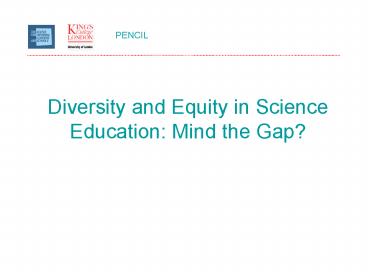Diversity and Equity in Science Education: Mind the Gap - PowerPoint PPT Presentation
1 / 22
Title:
Diversity and Equity in Science Education: Mind the Gap
Description:
Source: Annual Directory of Association of Science-Technology Centres. Jonathan Osborne ... Research would suggest that in the UK - there is not a problem ... – PowerPoint PPT presentation
Number of Views:94
Avg rating:3.0/5.0
Title: Diversity and Equity in Science Education: Mind the Gap
1
Diversity and Equity in Science Education Mind
the Gap?
2
Take up of Science Post-16 (UK)
Humanities
Mixed
Science Maths only
3
Decline in Interest in Science
- Well documented
- Osborne, J. F., Simon, S., Collins, S. (2003).
Attitudes towards Science A Review of the
Literature and its Implications. International
Journal of Science Education, 25(9), 1049?1079. - Osborne, J. F., Collins, S. (2001). Pupils'
views of the role and value of the science
curriculum a focus-group study. International
Journal of Science Education, 23(5), 441-468. - Cerini, B., Murray, I., Reiss, M. (2003).
Student Review of the Science Curriculum. London
NESTA. - International
- American Centres for Learning Teaching (Maths
Science) - Maths and Science Partnershps initiative
- Canadian CRYSTAL project
- DfES/Wellcome Science Learning Centres
4
Why?
- Science is perceived as hard
- Tension between the needs of the science and the
supply chain and educating the individuals for
citizenship - Former requires an authoritarian and dogmatic
approach - Latter requires more discursive space to teach
about science and explore the implications - Increasing diversity of choice post 16
- Live in an increasingly humanistic society
- Lack of intellectual rigour
- Poor careers vision held by teachers of science
- Alternative and better sources of information -
the growth of th informal sector
5
Cognitive Demand National Tests at Age 14
6
Science in the Media
Study casts doubt on heart risk factors
Birds and bees love genetic crops
Air crew risk breast cancer
Climate change may be hitting water quality
Glass of wine halves chance of pregnancy
7
(No Transcript)
8
- I find the sciences interesting, rich,
cultivated, civilized, useful, passionately
engaging and I cant understand how so many
scientists comply in making them cold, stupid,
uncouth, contradictory, antisocial, useless and
boring
9
(No Transcript)
10
(No Transcript)
11
The Most Important Scientific Discoveries
(Teachers n118)
DNA 27 Splitting the Atom 21 Silicon
Chip/Microchip 21 Space 19 Penicillin 18 P
lastics/Polymers 15 Genetic Engineering 14 Com
puters 13
The Stepping Stones of the Century
12
The Most Important Scientific Discoveries
(Students n1018)
Personal Computers 39 TV 24 Laser
Technology 23 Space/Science Fiction 17 Video
16 Telephone 14 Motor Cars 7
The World around me
13
Careers
- Munro, M., Elsom, D. (2000). Choosing Science
at 16 The Influences of Science Teachers and
Careers Advisors on Students? Decisions about
Science Subjects and Science and Technology
Careers. Cambridge Careers Research and Advisory
Centre (CRAC). - Hughes, G. (2000). Marginilization of
Socioscientific Material in Science-Technology-Soc
iety Curricula Some Implications for Gender
Inclusivity and Curriculum Reform. Journal of
Research in Science Teaching, 37(5), 426-440. - Fielding, H. (1998). The Undesirable Choices?
Unpublished Undergraduate, King's College London,
London.
14
Growth in Science Centres and Museums
Source Annual Directory of Association of
Science-Technology Centres
15
Comparing learning - Informal v Formal Context
Based on Wellington, J (1990) Formal and
Informal learning in Science. The role of
interactive science centers Physics Education 25
(5) 247-252
16
Formal v Informal Learning
- Defined Curriculum
- Necessary Pedagogy
- Required Assessment
- No Curriculum
- No defined pedagogy
- No Assessment
17
What do museums offer?
- Opportunity to meet experts - scientists,
curators, specialist education staff.
18
What do museums offer?
- Opportunities for joint experimentation,
observation and interaction. - Opportunities for play leading to development of
skills in observation and the experimentation of
ideas. - A chance for the role of teacher and student to
alternate..
19
Ethnic Diversity
- Research would suggest that in the UK - there is
not a problem - Ethnic minorities are not under but
over-represented - Not evenly spread
- Teacher recruitment is not a problem
- Evidence that teacher retention is
- Significance of role models is questionable
- Not a homogeneous group
- Involuntary minorities (African
American/Afro-Caribbean) - Voluntary Minorities (Asian)
- Autonomous Groups (Jewish)
- Evidence of Different Groups have different
Discourses - However others would suggest that this is
essentially a problem of class/youth culture - White working class are under-represented.
20
Sources
- MODOOD, T. (1993) The number of ethic minority
students in British higher education some
grounds for optimism, Oxford Review of Education,
19, pp. 167-182. - MODOOD, T. (1998) Ethnic minorities drive for
qualifications, in T. MODOOD T. ACLAND (Eds)
Race and Higher Education experiences,
challenges and policy implications (London,
Policy Studies Institute) - MODOOD, T. SHINER, M. (1994) Ethnic Minorities
and Higher Education why are there differential
rates of entry? (London, Policy Studies
Institute). - MODOOD, T., BERTHOUD, R., LAKEY, J., NAZROO, J.,
SMITH, P., VIRDEE, S. BEISHON, S. (1997) Ethnic
Minorities in Britain diversity and disadvantage
(London, Policy Studies Institute).
21
Gender
- Problem is one of the uptake of Physics,
Mathematics and Engineering - Reforms of the 1980s have had some effect -
feminization of chemistry - The problem is chronic
22
What we might want to know
- What is the data on uptake?
- What do young women define as being a good
career and why? - Focus groups with different ethnic groupings to
discover what they think about school
science/science why - Review of educational research in this country
and the US on what we know and what has been
done. - Identifying and tracking ability
- What would be the impact of scholarships on post
16 colleges - Science Teachers and Ethnic Minority Populations































